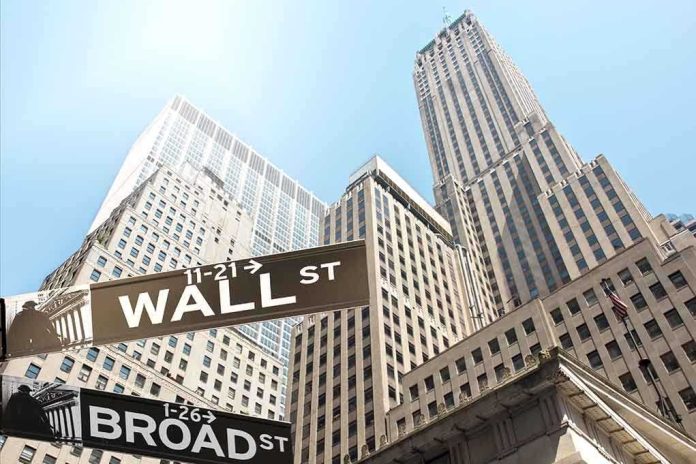
A respected analyst warns that Americans are ignoring the runaway AI investment frenzy, risking a financial collapse even more devastating than 2008—and few leaders seem willing to listen.
Story Snapshot
- An analyst who predicted the dot-com bubble warns the current AI market could spark a crisis worse than 2008.
- AI investments and valuations have reached all-time highs, echoing past bubbles while oversight lags behind.
- Tech giants and Wall Street are fueling the boom, but concerns mount over regulatory gaps and societal risks.
- A growing disconnect exists between expert warnings and the optimism of investors and policymakers.
Analyst Issues Dire Warning Over AI Market Risks
An influential financial analyst, renowned for accurately calling the dot-com bubble burst, now cautions that America is sleepwalking toward another economic disaster—this time, driven by runaway artificial intelligence investment.
In 2025, as AI adoption explodes across nearly every sector, the analyst draws direct parallels to the unchecked exuberance that fueled the tech crash of 2000, emphasizing that the stakes—and the potential fallout—are even higher now. The warning highlights an unsettling reality: investors and policymakers are largely tuning out calls for restraint, ignoring the mounting systemic risks that come with unchecked AI market exuberance.
The scale of current AI investment dwarfs previous market booms. Major tech companies like Microsoft and Google have announced AI infrastructure spending of $80 billion and $75 billion, respectively, in 2025 alone.
Startups and venture capital continue to pour unprecedented sums into generative AI, with the sector projected to reach $59 billion this year and potentially $400 billion by 2031. Such explosive growth is reminiscent of the speculative fervor that preceded past crashes, raising fears that the market may be inflating a dangerous bubble.
Despite these warning signs, many investors and executives remain focused on short-term gains, sidelining the analyst’s calls for caution.
Regulatory Gaps and the Threat to Economic Stability
While AI’s integration into business, healthcare, finance, and manufacturing is accelerating, regulatory oversight has not kept pace. The analyst and several industry experts argue that this lack of effective governance leaves markets—and by extension, American families—vulnerable to sudden shocks.
Skeptics point to the bipartisan failure to enact robust rules or ethical frameworks, allowing tech giants to set the agenda and consolidate power. As in previous crises, the cost of inaction could fall hardest on ordinary Americans, whose retirement savings and job security are exposed to the whims of an overheated market. Calls for congressional action have so far yielded little tangible progress, deepening conservative concerns about government accountability and market stability.
Labor unions and ESG investors have stepped up shareholder activism, demanding stronger risk controls and transparency from AI firms. However, tech industry lobbying and political inertia continue to stall meaningful reforms. Meanwhile, the United States faces stiff competition from China, which is rapidly closing the gap in AI development.
This geopolitical rivalry adds another layer of uncertainty for American workers and businesses, as global power dynamics shift and critical industries become ever more dependent on algorithms and automation.
Pervasive Societal Risks: From Job Loss to Privacy Erosion
Beyond the financial risks, the analyst warns that unbridled AI adoption threatens to upend the workforce and erode individual freedoms. Automation is rapidly displacing jobs across sectors, potentially exacerbating inequality and undermining family economic security.
Privacy concerns are mounting as AI tools collect and process unprecedented amounts of personal data, often with scant oversight or consent. These developments strike at the heart of conservative values—individual liberty, self-determination, and the sanctity of the family unit. Experts from Stanford and Harvard have called for urgent reforms, but the disconnect between expert guidance and public policy remains stark.
Will Lessons From the Past Be Heeded—Or Ignored?
Despite the analyst’s proven track record and the growing body of expert concern, Wall Street and Silicon Valley continue to chase profits, repeating familiar patterns of denial and groupthink.
Conservative Americans who have seen the cost of reckless government spending and runaway inflation know all too well the dangers of ignoring hard truths until it’s too late. The current AI frenzy, left unchecked, could deliver a blow not just to markets, but to the social and constitutional fabric of the nation. Whether leaders will heed these warnings—or let history repeat itself—is a question with consequences for every American.
Analyst who called the dot-com bubble says Americans are turning a deaf ear to AI warnings—and a worse meltdown than 2008 looms | Fortune https://t.co/SLtcfbNv44
— Donald Haché (@DonaldHache) November 24, 2025
As AI becomes ever more entrenched in daily life, the need for principled governance and market discipline grows more urgent. The analyst’s warning is a call to defend not just financial stability, but the core values and freedoms that define America’s character. Without immediate action, the next crisis may be far more damaging—and far harder to recover from—than anything seen before.
Sources:
Leading Generative AI Companies
AI in Focus in 2025: Boards and Shareholders Set Their Sights on AI
What’s Going On With AI In 2025 and Beyond?
State of AI in Business 2025 Report
Top Key Players Shaping the Future of Artificial Intelligence (AI) Robots Industry




